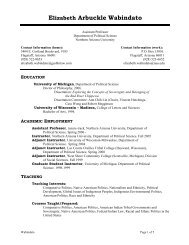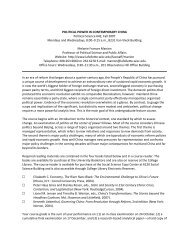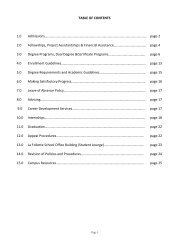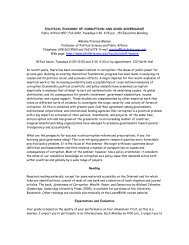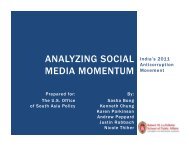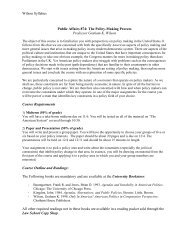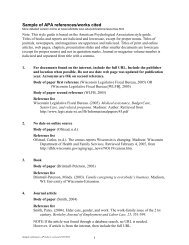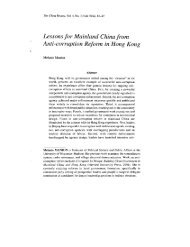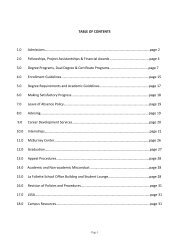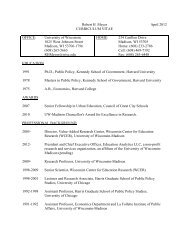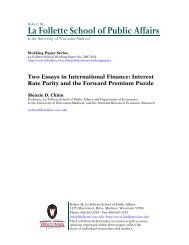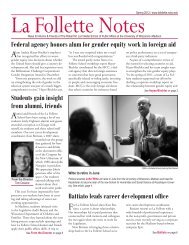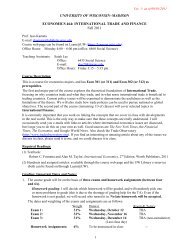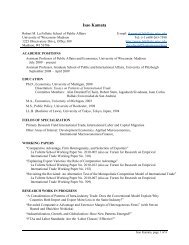SAVE Commission's findings - La Follette School of Public Affairs ...
SAVE Commission's findings - La Follette School of Public Affairs ...
SAVE Commission's findings - La Follette School of Public Affairs ...
Create successful ePaper yourself
Turn your PDF publications into a flip-book with our unique Google optimized e-Paper software.
cates <strong>of</strong> transportation convenience” to help<br />
state and local government makes cost effective<br />
decisions.<br />
GOAL #9: THE KNOWLEDGE ECONOMY<br />
9.1<br />
Sell intellectual capital in the knowledge<br />
economy. To capitalize on the next wave <strong>of</strong><br />
economic growth that will turn businesses into<br />
educators and states into global pr<strong>of</strong>it centers,<br />
sell Wisconsin’s intellectual capital in partnerships<br />
involving businesses, public colleges and<br />
the UW’s international alumni.<br />
9.2<br />
Aggressively tap Wisconsin’s knowledge capacity<br />
for state use. To fully use public and<br />
private sector potential, implement past state<br />
and Carnegie Commission recommendations<br />
to aggressively tap knowledge in areas such as<br />
technological sciences, micro-machinery, composites,<br />
medicine and environment.<br />
CHAPTER 3: LIFELONG LEARNING IN A<br />
HIGH-TECH AGE<br />
GOAL #10: LIFELONG LEARNING<br />
10.1<br />
Create a Department for Education, headed<br />
by a cabinet secretary. To provide new leadership<br />
for education that begins in early childhood<br />
and lasts throughout life, create a department<br />
that recognizes and works with all<br />
educational activities, including formal K-12<br />
public schooling, as well as learning in the<br />
home, workplace and community. The Secretary<br />
should be appointed by the Governor and<br />
the new state Board <strong>of</strong> Education, subject to<br />
Senate confirmation. The decision also includes:<br />
a. Create a citizen K-12 Board for Education.<br />
To provide continuing attention to<br />
educational issues, create a governor appointed,<br />
staggered six-year term board <strong>of</strong><br />
seven persons representing educational,<br />
business, parental, technical college and<br />
university interests.<br />
b. Plan for long term inter-educational system<br />
coordination. To address the continuing<br />
educational turf issues while recognizing<br />
the need for seamless, lifelong learning,<br />
the long term objective <strong>of</strong> the state<br />
should be to create an effective mechanism<br />
that will result in one, results-driven system.<br />
c. Eliminate the Constitutional Office <strong>of</strong> Su-<br />
10.2<br />
10.3<br />
perintendent <strong>of</strong> <strong>Public</strong> Instruction. This<br />
<strong>of</strong>fice is replaced by the new Secretary for<br />
Education.<br />
Prepare educational boards for greater effectiveness<br />
and accountability. To provide for<br />
greater taxpayer accountability and effectiveness<br />
on the part <strong>of</strong> local educational boards:<br />
a. Require that technical college district<br />
boards be elected. To provide greater accountability<br />
to taxpayers and eliminate the<br />
unrealistic mix <strong>of</strong> detailed requirements for<br />
technical school board members, elect the<br />
boards to govern the state’s 16 technical college<br />
districts, with some seats designated<br />
for certain constituencies and diversity.<br />
b. Train all local educational board members<br />
to enhance their effectiveness. To encourage<br />
board member development in technical<br />
college and K-12 districts, provide intensive<br />
technical and leadership training.<br />
c. Relieve local school boards <strong>of</strong> low priority<br />
mandates and reporting. To achieve local<br />
control and reduce paperwork, eliminate<br />
state mandates and reporting requirements<br />
that inhibit site-based management and<br />
result in unnecessary paperwork and costs<br />
at all levels.<br />
Study administrative efficiencies. The new<br />
Secretary for Education and state Board for<br />
Education should study ways to improve efficiency<br />
and effectiveness while reducing duplicative<br />
staffing. Among these services are:<br />
a. The transfer <strong>of</strong> aid distribution, including<br />
transportation aids;<br />
b. The transfer <strong>of</strong> health, nutrition and social<br />
services programs;<br />
c. The transfer <strong>of</strong> telecommunications operation<br />
and library services;<br />
d. The transfer <strong>of</strong> teacher licensing and revocation;<br />
e. The transfer <strong>of</strong> tech-prep administration;<br />
and<br />
f. The transfer <strong>of</strong> job training functions.<br />
CITIZEN • COMMUNITY • GOVERNMENT — WISCONSIN: THE 21 ST CENTURY 63



